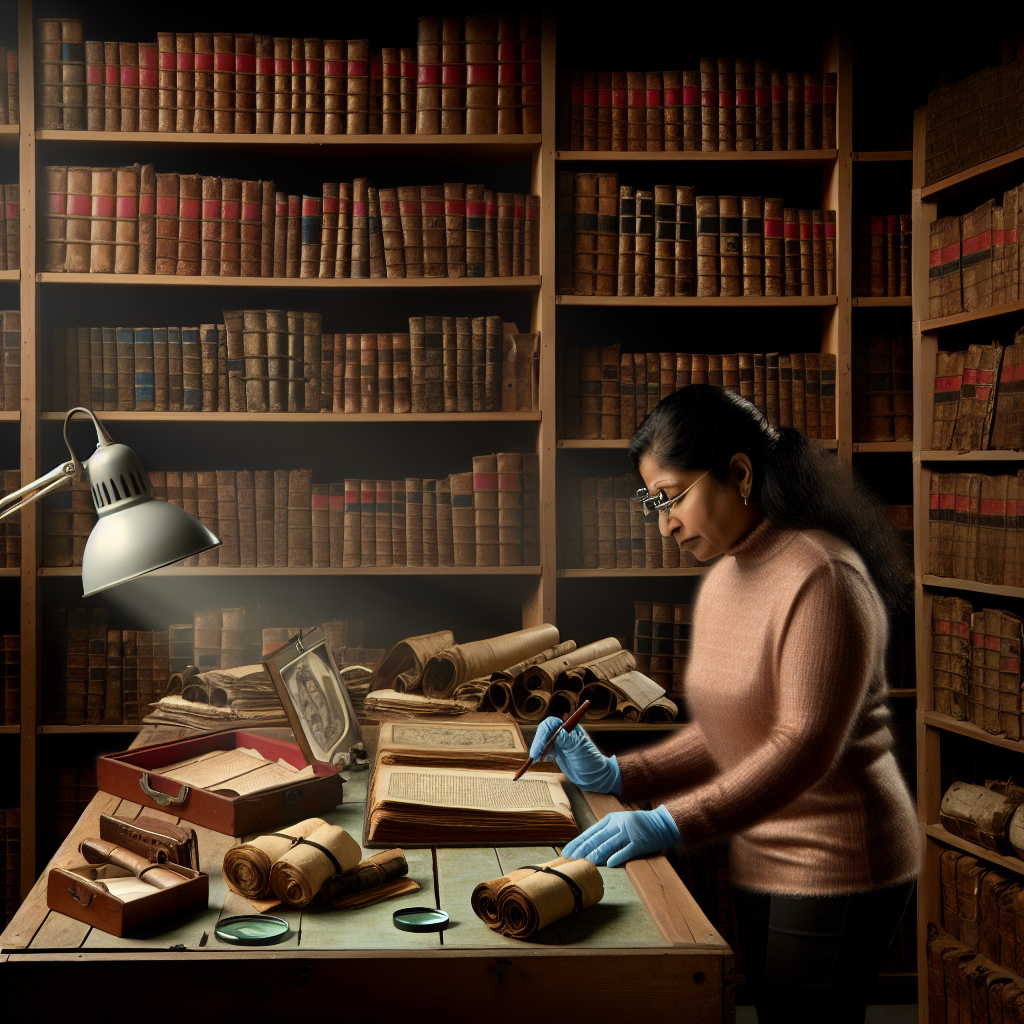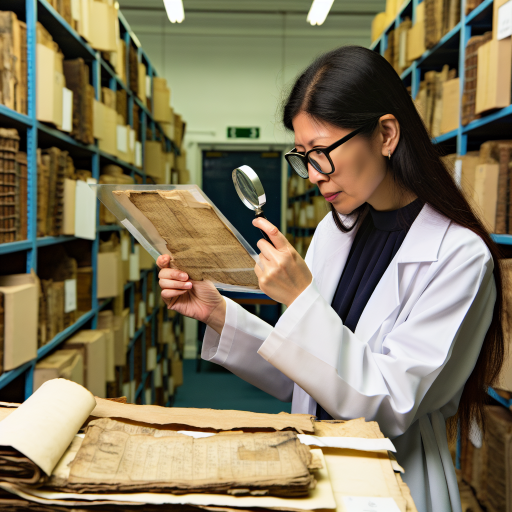Overview of the Role of an Archivist
An archivist plays a crucial role in preserving historical documentation.
They organize, manage, and maintain archives for easy access.
This profession ensures the integrity and authenticity of historical records.
Archivists work with various types of materials, including documents, photos, and digital files.
In addition, they help individuals and organizations locate specific information.
Key Responsibilities
Archivists evaluate records for retention and disposal.
They develop and implement preservation strategies for archival materials.
Moreover, they create metadata to facilitate information retrieval.
Education and training programs often focus on these important skills.
Importance of Accessibility
Ensuring access to archives fosters research and education.
Archivists assist researchers by providing necessary resources and documentation.
They also promote public engagement through exhibitions and outreach programs.
Collaboration and Communication
Archivists often collaborate with historians, conservationists, and librarians.
Effective communication skills are essential to convey the significance of archives.
They may conduct workshops to educate others about archival practices.
Adapting to Technology
Modern archivists must adapt to technological advancements in information management.
They utilize software tools for digital preservation and organization.
This adaptation enhances their ability to manage growing digital collections.
Educational Background Required for Archivists
Essential Degree Requirements
Archivists typically hold a master’s degree in archival science or a related field.
Many universities offer specialized programs focused on archives and records management.
Besides archival science, degrees in library science are also common among archivists.
Additionally, history, information science, and museum studies provide valuable knowledge.
Importance of Accreditation
Choosing accredited programs is crucial for building a strong foundation in archival practice.
Accreditation ensures a standard of education that employers recognize and respect.
Organizations like the American Library Association accredit library and archival science programs.
Unlock Your Career Potential
Visualize a clear path to success with our tailored Career Consulting service. Personalized insights in just 1-3 days.
Get StartedInternships and Practical Experience
Internships play a vital role in the education of future archivists.
Practical experience enhances the theoretical knowledge gained in the classroom.
Many programs require students to complete internships at libraries, museums, or archives.
Internships help build professional networks essential for future employment.
Continuous Professional Development
Archivists must stay updated with evolving standards and technologies in the field.
Attending workshops and conferences is crucial for ongoing education.
Professional organizations offer training sessions that help archivists enhance their skills.
Continuous learning ensures archivists remain competitive in the job market.
Common Degrees and Specializations for Aspiring Archivists
Educational Background
A degree in history is a strong foundation for aspiring archivists.
This field provides essential research and analytical skills.
Additionally, many universities offer specialized programs in archival studies.
Libraries and information science degrees are also popular choices.
These programs teach students about information management techniques.
Moreover, students learn about digital archiving practices.
Relevant Specializations
Archivists can choose from various specializations within the field.
Digital archiving focuses on preserving electronic records.
This specialization responds to the growing demand for digital information management.
Historical preservation is another specialization for archivists.
This field requires knowledge of conservation techniques.
Additionally, it emphasizes the importance of physical artifacts.
Advanced Degrees and Certifications
Some archivists pursue a master’s degree in a related field.
This advanced education can enhance job prospects and expertise.
There are also specific certifications available for archivists.
For example, the Academy of Certified Archivists offers a certification program.
Obtaining this credential demonstrates proficiency in archival management.
Furthermore, continuing education is crucial to stay current in the field.
Practical Experience
Internships during education provide crucial hands-on experience.
Many programs include internship opportunities for students.
Real-world experience enhances understanding and skill-building.
Volunteering at local museums or archives is another way to gain experience.
Such opportunities also allow networking within the professional community.
Delve into the Subject: Essential Tools for Canadian Digital Content Creators
Importance of Certifications in Archival Profession
Enhancing Professional Credibility
Certifications significantly enhance an archivist’s professional credibility.
They demonstrate a commitment to maintaining high industry standards.
Furthermore, certifications can increase trust among colleagues and stakeholders.
Expanding Knowledge and Skills
Obtaining certifications helps archivists expand their knowledge base.
They gain specialized skills applicable to various archival practices.
For instance, programs like the Certified Archivist credential cover critical competencies.
Improving Employment Opportunities
Certifications can greatly improve job prospects for archivists.
Employers often prefer candidates with recognized qualifications.
Additionally, certifications can open doors to advanced roles within the profession.
Networking and Professional Associations
Many certification programs offer networking opportunities.
These connections can lead to collaborations and job referrals.
Joining professional associations can further enhance an archivist’s career.
Keeping Up with Industry Trends
Certifications require continuous education and skill review.
Staying updated ensures archivists remain competitive in the field.
Moreover, it cultivates a proactive approach to archiving practices.
You Might Also Like: Exploring Income Streams for Canadian Content Creators
Skills and Competencies Needed for Successful Archivists
Organizational Skills
Archivists must possess strong organizational skills.
They manage large volumes of documents and artifacts.
Additionally, they develop efficient classification systems.
Attention to Detail
Meticulous attention to detail is crucial for archivists.
They need to accurately catalog materials and data.
Furthermore, they review items for damage and preservation.
Research Proficiency
Effective archivists demonstrate strong research skills.
They locate information from various sources efficiently.
Moreover, they analyze historical context critically.
Communication Skills
Outstanding communication skills are essential for archivists.
They interact with visitors, researchers, and stakeholders.
Additionally, they write reports and documentation regularly.
Technological Proficiency
Archivists must be proficient with technology.
They use digital tools for data management and preservation.
Moreover, they adapt to new software and systems rapidly.
Knowledge of Preservation Techniques
Understanding preservation techniques is vital for archivists.
They employ various methods to protect materials.
Furthermore, they stay informed about conservation best practices.
Ethical Understanding
Archivists must have a strong grasp of ethical considerations.
They ensure respectful handling of sensitive information.
In addition, they advocate for equitable access to materials.
Interpersonal Skills
Effective interpersonal skills enhance an archivist’s role.
They collaborate with teams and communities for projects.
Additionally, they foster great relationships with stakeholders.
Explore Further: Building a Loyal Community as a Digital Content Creator

Internships and Practical Experience in Archival Work
The Importance of Internships
Internships play a crucial role in developing practical skills for archivists.
They provide hands-on experience in real-world archival settings.
Additionally, internships help students build professional networks in the field.
Many employers prefer candidates with relevant internship experience.
Finding Internship Opportunities
Students can explore various avenues for internship placements.
University career services often list available internship opportunities.
Professional organizations, like the Society of American Archivists, also provide resources.
Networking with professionals in archives can lead to potential internships.
Local museums and historical societies frequently offer internship programs.
Types of Internship Experiences
Internships may include different types of practical experience.
Processing archival collections is a common responsibility.
Interns may assist with digitization projects to preserve materials.
They can also participate in outreach activities to engage the public.
Some internships focus on archival research and developing finding aids.
Gaining Skills and Knowledge
Internships enable participants to acquire essential skills in the field.
Data management and record-keeping are crucial competencies for archivists.
Furthermore, interns learn about metadata standards and archival ethics.
Communication skills improve significantly through public interaction.
Problem-solving and critical thinking skills are refined during hands-on tasks.
Leveraging Internship Experience
Once interns complete their programs, they should leverage their experience.
Updating resumes with new skills can enhance job prospects significantly.
Networking connections gained during internships can lead to job opportunities.
Interns should seek references from supervisors to support future applications.
Lastly, reflecting on lessons learned helps consolidate the internship experience.
Gain More Insights: Navigating Legal Considerations for Digital Content Creators
Continuing Education and Professional Development Opportunities
Importance of Ongoing Learning
Continuing education is essential for archivists to stay relevant.
This field constantly evolves due to technology and methodologies.
Furthermore, ongoing learning enhances professional skills.
Certification Programs
Various certification programs offer specialized training for archivists.
The Academy of Certified Archivists helps professionals validate their skills.
Additionally, certifications can open new career opportunities.
Workshops and Conferences
Attending workshops provides hands-on experience with new tools.
Conferences foster networking opportunities with industry experts.
Organizations like the Society of American Archivists host annual events.
Online Resources
Online courses allow for flexible learning options.
Platforms such as Coursera and edX offer relevant courses.
These resources can help archivists learn at their own pace.
Professional Organizations
Joining professional organizations can enhance growth opportunities.
They often provide resources for training and certification.
Networking with peers can lead to mentorship opportunities.
Local Networking Groups
Local archivist groups offer support and shared learning.
These groups organize meetups and discussions on best practices.
Participation can foster collaborative projects and initiatives.
Continuing Education Units (CEUs)
Many institutions offer CEUs for training and workshops.
Collecting CEUs can be essential for license renewal.
Keeping track of educational advancements is crucial for career growth.
Future Trends in Archival Education and Technology Integration
Increasing Demand for Digital Skills
Archives are rapidly transitioning to digital formats.
Archivists must develop expertise in digital asset management.
Therefore, training programs are focusing on digital curation.
Many institutions now prioritize technology proficiency in their curricula.
Consequently, professionals need to update their skills continually.
Integration of Artificial Intelligence
Artificial intelligence is revolutionizing archival processes.
We see AI being used for data categorization and retrieval.
This technology enhances efficiencies in managing large datasets.
Moreover, AI tools are improving access to archival materials.
As a result, archivists must embrace these advancements.
Interdisciplinary Collaboration
Collaboration between various fields is becoming essential.
Archivists now work closely with information technology specialists.
This teamwork fosters innovative solutions for archival challenges.
Additionally, partnerships with historians enrich archival practices.
Such collaborations are crucial for effective information management.
Emphasis on Public Engagement
Engaging the public is a growing trend in archival practices.
Archivists are developing programs to educate communities.
These initiatives increase awareness and appreciation for archives.
Furthermore, social media is leveraged to reach wider audiences.
This focus on public engagement enhances archival relevance.
Ethical Considerations and Inclusivity
Ethical practices in archival work are under scrutiny.
Archivists are challenged to address issues of representation.
They are implementing strategies for more inclusive archiving.
This approach aims to preserve diverse histories and voices.
Ultimately, ethics and inclusivity will guide future practices.
Additional Resources
Leading Job Board in the Arts and Culture Sector – NYFA Classifieds




